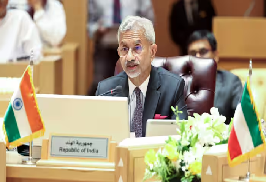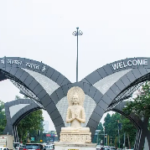External Affairs Minister S. Jaishankar highlighted India’s diplomatic focus on mitigating tensions between Israel and Iran, describing their relationship—or the lack thereof—as a major concern. Speaking at the Manama Dialogue in Bahrain, Jaishankar also addressed security challenges in the Red Sea and emphasized the importance of connectivity projects for India’s economic growth.
“In recent times, for all of us, the relationship or absence of it between Israel and Iran has been particularly a source of concern, so some of our diplomatic efforts have focused on that particular aspect,” Jaishankar said. He refrained from elaborating on the specifics of India’s diplomatic efforts, but his comments come amid escalating tensions in the region.
In October, Iran fired around 200 missiles into Israel in response to the killing of Hezbollah chief Hassan Nasrallah and other commanders by Israeli forces. Israel retaliated with strikes on Iranian targets, raising global alarm over the deteriorating situation. Jaishankar’s remarks underscore India’s growing role in addressing geopolitical instability in the region, which has significant implications for global trade and security.
Jaishankar emphasized the importance of West Asia for India, citing the country’s burgeoning economic footprint. “India is today almost a USD 4 trillion economy, (and) we expect to comfortably double that this decade. Our trade is today around USD 800 billion, that too should at least double this decade,” he said.
“This region is, for us, the world beyond our borders that immediately awaits us,” he added, highlighting India’s stakes in fostering stability and growth in the region. Referring to maritime security, Jaishankar stressed the need for regional cooperation to tackle challenges in the Red Sea, which have disrupted trade and increased shipping costs.
“And we have had very significant security challenges in this area with a very deep and disastrous impact for trade in Asia,” he said. India has maintained a naval presence in the Gulf of Aden, Somalia, and the Northern Arabian Sea, responding to 24 incidents in the past year, escorting 250 ships, and rescuing 120 crew members.
“We are working in tandem with Operation Prosperity Guardian and have our own nationally named operation,” Jaishankar said, referencing the US-led initiative to address security threats in the southern Red Sea and Gulf of Aden.
Jaishankar also discussed transformative connectivity projects, including the India-Myanmar-Thailand Trilateral Highway (IMTT), the International North-South Transport Corridor (INSTC), and the India-Middle East-Europe Economic Corridor (IMEC). “In fact, one day, when these corridors are done, the IMEC will bring the Atlantic to India, the IMTT will actually take that connectivity from India to the Pacific,” he said.
“So you can actually envisage a connectivity corridor from the Atlantic to the Pacific, going through southern Europe, going through the Arabian Peninsula, cutting through the southern part of the Asian continent.” India is expanding its bilateral naval exercises in the Gulf and Mediterranean regions.
“In the Gulf, our partners have become fairly regular. In the Mediterranean, apart from Israel, we’ve had significant exercises with Greece and Egypt,” he said.



